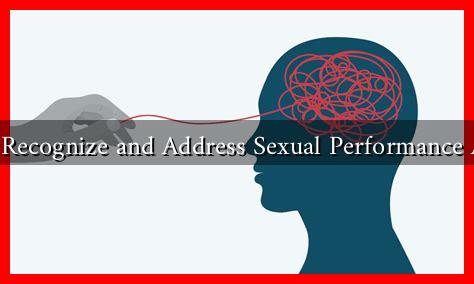-
Table of Contents
- How to Recognize and Address Sexual Performance Anxiety
- Understanding Sexual Performance Anxiety
- Recognizing the Signs
- Causes of Sexual Performance Anxiety
- Strategies to Address Sexual Performance Anxiety
- 1. Open Communication
- 2. Mindfulness and Relaxation Techniques
- 3. Setting Realistic Expectations
- 4. Seeking Professional Help
- 5. Education and Awareness
- Case Studies and Statistics
- Conclusion
How to Recognize and Address Sexual Performance Anxiety
Sexual performance anxiety is a common issue that affects many individuals, regardless of gender or sexual orientation. It can lead to feelings of inadequacy, frustration, and even relationship problems. Understanding how to recognize and address this anxiety is crucial for maintaining a healthy sexual life. This article will explore the signs of sexual performance anxiety, its causes, and effective strategies for overcoming it.
Understanding Sexual Performance Anxiety
Sexual performance anxiety refers to the fear or worry about one’s ability to perform sexually. This anxiety can manifest in various ways, including difficulty achieving or maintaining an erection, premature ejaculation, or a lack of sexual desire. According to a study published in the Journal of Sexual Medicine, approximately 30% of men and 20% of women report experiencing some form of sexual performance anxiety at some point in their lives.
Recognizing the Signs
Identifying sexual performance anxiety is the first step toward addressing it. Here are some common signs to look out for:
- Increased heart rate or sweating during sexual situations.
- Negative self-talk or feelings of inadequacy.
- Difficulty becoming aroused or maintaining an erection.
- Avoidance of sexual situations or intimacy.
- Physical symptoms such as nausea or headaches before sexual encounters.
Recognizing these signs can help individuals understand that they are not alone in their experiences and that help is available.
Causes of Sexual Performance Anxiety
Understanding the root causes of sexual performance anxiety can aid in addressing it effectively. Some common causes include:
- Past Experiences: Negative sexual experiences, such as a previous failure to perform, can create a cycle of anxiety.
- Unrealistic Expectations: Societal pressures and media portrayals of sex can lead to unrealistic standards.
- Relationship Issues: Lack of communication or unresolved conflicts with a partner can contribute to anxiety.
- Psychological Factors: Conditions such as depression, anxiety disorders, or low self-esteem can exacerbate performance anxiety.
Strategies to Address Sexual Performance Anxiety
Addressing sexual performance anxiety involves a combination of self-help strategies, communication, and professional support. Here are some effective approaches:
1. Open Communication
Discussing concerns with a partner can alleviate anxiety. Open dialogue fosters understanding and support, which can enhance intimacy.
2. Mindfulness and Relaxation Techniques
Practicing mindfulness, meditation, or deep-breathing exercises can help reduce anxiety levels. These techniques promote relaxation and can improve focus during sexual encounters.
3. Setting Realistic Expectations
Understanding that sexual experiences can vary and that perfection is not the goal can help reduce pressure. Embracing the idea that intimacy is about connection rather than performance can be liberating.
4. Seeking Professional Help
Therapists or sex counselors can provide valuable insights and coping strategies. Cognitive-behavioral therapy (CBT) has been shown to be effective in treating performance anxiety.
5. Education and Awareness
Learning about sexual health and performance can demystify the experience. Resources such as books, workshops, or reputable online platforms can provide useful information.
Case Studies and Statistics
Research indicates that sexual performance anxiety is prevalent among both men and women. A survey conducted by the American Psychological Association found that 40% of men and 25% of women reported experiencing anxiety related to sexual performance. Case studies reveal that individuals who actively engage in communication and seek professional help often report significant improvements in their sexual experiences.
Conclusion
Sexual performance anxiety is a common issue that can affect anyone, but it is manageable with the right strategies. Recognizing the signs, understanding the causes, and implementing effective coping mechanisms can lead to a healthier sexual life. Open communication, mindfulness, and professional support are key components in overcoming this anxiety. Remember, you are not alone, and help is available.

